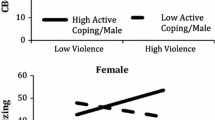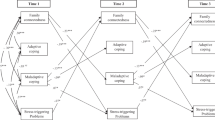Examined prospective associations among poverty-related family stress, coping, involuntary stress reactivity, and psychological symptoms in a sample of 79 rural, low-income adolescents. Poverty-related family stress predicted adolescents’ anxious/depressed and aggressive behavior 8 months later, controlling for prior symptoms. Coping interacted with initial symptoms and involuntary stress reactivity to predict changes in symptoms over time, showing that primary and secondary control coping were most strongly associated with changes in symptoms for adolescents with low initial symptoms and involuntary stress reactivity. The only significant predictor of coping over time was prior coping, suggesting that coping is not symptom-driven and may be somewhat trait-like. Implications for interventions and additional research are offered.
Similar content being viewed by others
REFERENCES
Achenbach, T. M. (1991). Manual for the Youth Self-Report and 1991 Profile. University of Vermont Department of Psychiatry, Burlington, VT.
Aiken, L. S., and West, S. G. (1991). Multiple regression: Testing and interpreting interactions. Sage Publications, Thousand Oaks, CA.
Caspi, A., Sugden, K., Moffitt, T. E., Taylor, A., Craig, I. W., Harrington, H., et al. (2003). Influence of life stress on depression: Moderation by a polymorphism in the 5-HTT gene. Science 301: 386–389.
Chang, E. C., and Strunk, D. R. (1999). Dysphoria: Relations to appraisals, coping, and adjustment. J. Couns. Psychol. 46: 99–108.
Clarke, G., Lewinsohn, P., and Hops, H. (1990). Adolescent Coping with Depression Course. Castalia Publishing, Eugene, OR.
Cleveland, H. H. (2003). Disadvantaged neighborhoods and adolescent aggression: Behavioral genetic evidence of contextual effects. J. Res. Adolesc. 13: 211–238.
Cole, P. M., Zahn-Waxler, C., and Smith, K. D. (1994). Expressive control during a disappointment: Variations related to preschoolers’ behavior problems. Dev. Psychol. 30: 835–846.
Compas, B. E., Connor, J. K., Harding, A., Saltzman, H., and Wadsworth, M. (1999). Getting specific about coping: Effortful and involuntary responses to stress in development. In Lewis, M., and Ramsey, D. (eds.), Soothing and Stress. Cambridge University Press, New York, pp. 229–256.
Compas, B. E., Connor-Smith, J. K., Saltzman, H., Thomsen, A. H., and Wadsworth, M. E. (2001). Coping with stress during childhood and adolescence: Progress, problems, and potential in theory and research. Psychol. Bull. 12: 87–127.
Compas, B. E., Forsythe, C. J., and Wagner, B. M. (1988).Consistency and variability in causal attributions and coping with stress. Cogn. Ther. Res. 12: 305–320.
Conger, R. D., and Conger, K. J. (2002). Resilience in Midwestern families: Selected findings from the first decade of a prospective, longitudinal study. J. Marriage Fam. 4: 361–373.
Conger, R. D., Conger, K. J., Elder, G. H., Lorenz, F. O., Simons, R. L., and Whitbeck, L. B. (1993). Family economic stress and adjustment of early adolescent girls. Dev. Psychol. 29: 206–219.
Connor-Smith, J. K., Compas, B. E., Wadsworth, M. E., Thomsen, A. H., and Saltzman, H. (2000). Responses to stress in adolescence. Measurement of coping and involuntary stress responses. J. Consult. Clin. Psychol. 68: 976–992.
Ebata, A. T., and Moos, R. H. (1994). Personal, situational, and contextual determinants of coping in adolescents. J. Res. Adolesc. 4: 99–125.
Eisenberg, N., Fabes, R. A., and Guthrie, I. (1997). Coping with stress: The roles of regulation and development. In Sandler, I. N., and Wolchik, S. A. (eds.), Handbook of Children's Coping with Common Stressors: Linking Theory, Research, and Intervention. Plenum, New York, pp. 41–70.
Elder, G. H., and Caspi, A. (1988). Economic stress in lives: Developmental perspectives. J. Soc. Issues 44: 25–45.
Gomel, J. N., Tinsley, B. J., Parke, R. D., and Clark, K. M. (1998). The effects of economic hardship on family relationships among African American, Latino, and Euro-American families. J. Fam. Issues. 19: 436–467.
Grant, K. E., Compas, B. E., Stuhlmacher, A. F., Thurm, A. E., McMahon, S. D., and Halpert, J. A. (2003). Stressors and child and adolescent psychopathology: Moving from markers to mechanisms of risk. Psychol. Bull. 129: 447–466.
Gunthert, K. C., Cohen, L. H., and Armeli, S. (2002). Unique effects of depressive and anxious symptomatology on daily stress and coping. J. Social Clin. Psychol. 21: 583–609.
Gutman, L. M., and Eccles, J. S. (1999). Financial strain, parenting behaviors, and adolescents’ achievement: Testing model equivalence between African American and European American single- and two-parent families. Child Dev. 70: 1464–1476.
Haaga, D., and Beck, A. (1992). Cognitive therapy. In Paykel, E. S. (ed.), Handbook of Affective Disorders (2nd ed.). Guilford Press, New York, NY, pp. 511–523.
Holahan, C. J., Moos, R. H., Holahan, C. K., and Brennan, P. L. (1997). Social context, coping strategies, and depressive symptoms: An expanded model with cardiac patients. J. Pers. Soc. Psychol. 7: 918–928.
Hollingshead, A. B. (1975). Four factor index of social status. Unpublished manuscript. Yale University, Department of Sociology.
Hoyt, D. R., Conger, R. D., Valde, J. G., and Weihs, K. (1997). Psychological distress and help seeking in rural America. Am. J. Community Psychol. 25: 449–470.
Kagan, J., Snidman, N., and Arcus, D. M. (1995). Initial reactions to unfamiliarity. Curr. Dir. Psychol. Science. 1: 171–174.
Kim, K. J., Conger, R. D., Elder, G. H., and Lorenz, F. O. (2003). Reciprocal influences between stressful life events and adolescent internalizing and externalizing problems. Child Dev. 74: 127–143.
Lazarus, R. S., and Folkman, S. (1984). Stress, Appraisal, and Coping. Springer, New York.
Lewinsohn, P. M., and Talkington, J. (1979). Studies on measurement of unpleasant events and relations with depression. Appl. Psychol. Meas. 3: 83–101.
Matthews, G., and Wells, A. (1996). Attentional processes, dysfunctional coping, and clinical intervention. In Zeidner, M., and Endler, N. S. (eds.), Handbook of Coping: Theory, Research, Applications, pp. 573–601.
McLoyd, V. C. (1998). Socioeconomic disadvantage and child development. Am. Psychol. 53: 185–204.
McLoyd, V. C., Jayaratne, T. E., Ceballo, R., and Borquez, J. (1994). Unemployment and work interruption among African American single mothers: Effects on parenting and adolescent socioemotional functioning. Child Dev. 65: 562–589.
McMahon, S. D., Grant, K. E., Compas, B. E., Thurm, A. E., and Ey, S. (2003). Stress and psychopathology in children and adolescents: Is there evidence of specificity? J. Child Psychol. Psychiatry: Annu. Res. Rev. 44: 107–133.
Rothbart, M. K., Posner, M. I., and Hershey, K. L. (1995). Temperament, attention, and developmental psychopathology. In Cicchetti, D., and Cohen, D. (eds.), Developmental Psychopathology: Vol. 1. Theory and Methods. Wiley, New York, pp. 315–340.
Rudolph, K. D., Dennig, M. D., and Weisz, J. R. (1995). Determinants and consequences of children's coping in the medical setting: Conceptualization, review, and critique. Psychol. Bull. 11: 328–357.
Sandler, I. N., Tein, J., Mehta, P., Wolchik, S., and Ayers, T. (2000). Coping efficacy and psychological problems of children of divorce. Child Dev. 71: 1099–1118.
Sandler, I. N., Tein, J., and West, S. G. (1994). Coping, stress, and the psychological symptoms of children of divorce: A cross-sectional and longitudinal study. Child Dev. 65: 1744–1763.
St. Lawrence, J. S., and Ndiaye, S. M. (1997). Prevention research in rural communities: Overview and concluding comments. Am. J. Commun. Psychol. 25: 545–562.
Tolan, P. H., Gorman-Smith, D., Henry, D., Chung, K., and Hunt, M. (2003). The relation of patterns of coping of inner-city youth to psychopathology symptoms. J. Res. Adolesc. 12: 423–449.
Turkheimer, E., Haley, A., Waldron, M., D’Onofrio, B., and Gottesman, I. I. (2003). Socioeconomic status modifies heritability of IQ in young children. Psychol. Sci. 14: 623–628.
Valliant, G. (1977). Adaptation to Life. Little Brown, Boston.
Wadsworth, M. E., and Compas, B. E. (2002). Coping with economic strain and family conflict: The adolescent perspective. J. Res. Adolesc. 12: 243–274.
Wadsworth, M. E., Rieckmann, T., Benson, M. A., and Compas, B. E. (2004). Coping and responses to stress in Navajo adolescents: Psychometric properties of the Responses to Stress Questionnaire. J. Commun. Psychol. 32: 391–411.
Wandersman, A., and Nation, M. (1998). Urban neighborhoods and mental health: Psychological contributions to understanding toxicity, resilience, and interventions. Am. Psychol. 53: 647–656.
Wegner, D. M. (1994). Ironic processes of mental control. Psychol. Rev. 101: 34–52.
Weiss, B., Susser, K., and Catron, T. (1998). Common and specific features of child psychopathology. J. Abnorm. Psychol. 107: 118–127.
Author information
Authors and Affiliations
Corresponding author
Additional information
Assistant Professor, University of Denver. Received PhD from University of Vermont. Research interests include the effects of poverty on family functioning, developmental issues in stress and coping, and developmental psychopathology
Doctoral student in Clinical Psychology, University of Denver. Research interests include close relationship influences on adolescent development and psychopathology.
Rights and permissions
About this article
Cite this article
Wadsworth, M.E., Berger, L.E. Adolescents Coping with Poverty-Related Family Stress: Prospective Predictors of Coping and Psychological Symptoms. J Youth Adolescence 35, 54–67 (2006). https://doi.org/10.1007/s10964-005-9022-5
Received:
Revised:
Accepted:
Published:
Issue Date:
DOI: https://doi.org/10.1007/s10964-005-9022-5




